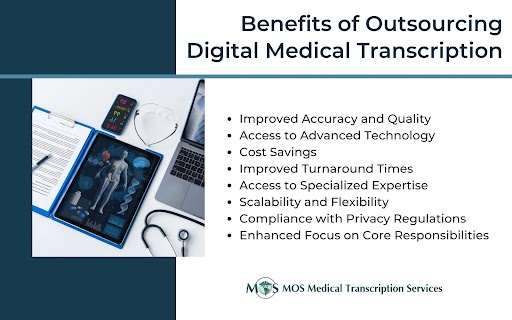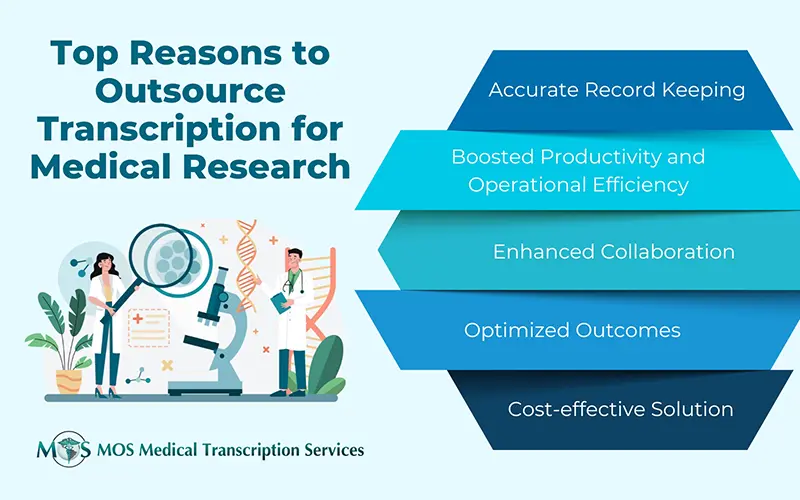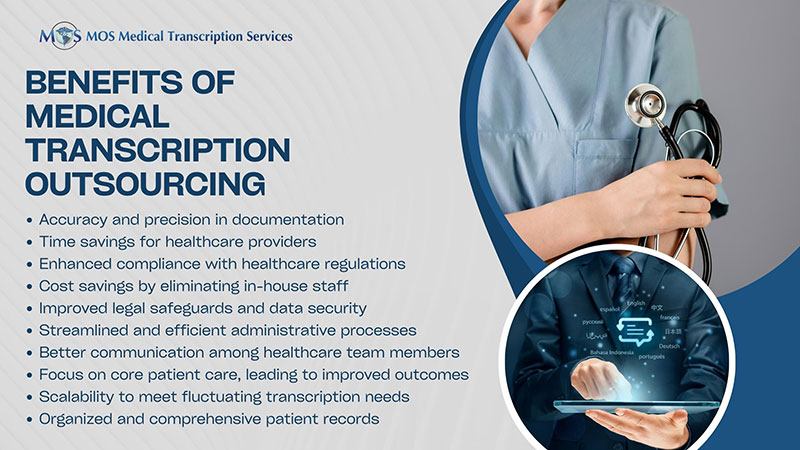
Table of Contents
Physician practices need precise and timely documentation for the delivery of quality care, treatment planning, billing, regulatory compliance, and reduced risk of liability claims. Outsourced digital medical transcription services have become an increasingly valuable strategy to achieve these goals. Delegating the task of transcribing medical recordings to an external service provider that utilizes digital tools and technology can ensure efficiency, timeliness, and accuracy.
How Outsourcing Digital Transcription Benefits Physician Practices
By outsourcing digital medical transcription, practices can expect the following benefits:
Improved Accuracy and Quality
Professional medical transcription companies employ highly skilled transcriptionists with expertise in medical terminology. They can convert audio recordings of physicians’ dictations-such as patient histories, consultations, diagnoses, and treatment plans—into precise, formatted text files. Timely, error-free documentation upholds patient safety, meets compliance standards, and supports coding and billing processes.
Access to Advanced Technology
These services use advanced tools like automated transcription software powered by artificial intelligence (AI), speech recognition (SR), natural language processing (NLP), secure cloud platforms, and electronic health record (EHR) systems to streamline transcription workflows. EHR-integrated medical transcription services ensure data is securely stored and readily accessible, improving overall productivity.
Cost Savings
Outsourcing eliminates the overhead costs associated with hiring and maintaining in-house transcription teams, such as salaries, training, software, and office space. Physicians only pay for the services they use, making it a cost-effective solution for healthcare facilities of all sizes.
Improved Turnaround Times
By leveraging digital tools, voice recognition software, and skilled professionals, expert teams deliver transcriptions quickly without compromising quality. Fast documentation enhances workflow efficiency, supporting timely patient care and claim submissions.
Access to Specialized Expertise
Many transcription service providers offer specialists who understand niche fields such as radiology, cardiology, or orthopedics, ensuring accurate documentation of complex medical terms and procedures.
Scalability and Flexibility
Services are customizable to meet the specific needs of healthcare providers. As your practice grows or experiences seasonal variations, an outsourced transcription partner can easily scale up or down to meet practices’ changing needs. This flexibility allows you to focus on patient care without worrying about staffing or capacity issues.
Compliance with Privacy Regulations
Outsourced transcription providers are well-versed in regulations such as HIPAA and ensure that all patient data is securely handled and stored. They use encryption, secure data transfer protocols, and stringent confidentiality agreements to protect sensitive information.
Focus on Core Responsibilities
Outsourcing transcription reduces the administrative burden on in-house staff, allowing them to focus on their core responsibilities like patient care, scheduling, and billing. This streamlined workflow improves overall efficiency and patient satisfaction.
Navigating Challenges in Digital Medical Transcription: Ensuring Accurate Documentation
While digital transcription has significantly advanced with AI and machine learning, it is not without its limitations. Despite its efficiency, certain challenges persist, particularly when dealing with complex medical terminology, poor audio quality, or nuanced language. These factors can hinder a machine’s ability to accurately interpret context, resulting in potential misinterpretations or errors in the transcribed text.
Challenges in Digital Transcription
- Complex medical terminology: Machines often struggle with recognizing intricate or less commonly used medical terms, especially if they have not been adequately trained on the specific terminology.
- Audio quality issues: Background noise, overlapping voices, or unclear speech can significantly impact the transcription accuracy of even the most sophisticated software.
- Language nuances: Regional accents, idiomatic expressions, or subtle differences in phrasing can confuse automated systems, leading to errors in capturing the intended meaning.
Ensuring Accuracy Through Rigorous Quality Checks
A reliable medical transcription company will have a robust quality assurance process in place to address these challenges. After the initial transcription—whether done by automated software or human transcriptionists—dedicated professionals review the files to identify and correct any errors.
These quality checks involve:
- Contextual analysis: Ensuring the transcribed content aligns with the intended meaning, particularly for nuanced medical terms.
- Term validation: Cross-checking medical jargon against industry standards and references to confirm accuracy.
- Audio cross-referencing: Re-listening to unclear portions of the audio to ensure fidelity in transcription.
- Proofreading: Ensuring grammar, spelling, and formatting meet the required standards for medical documentation.
By combining advanced technology with human expertise, trusted medical transcription providers achieve accuracy rates of up to 99%, ensuring the highest standards of quality. This meticulous approach not only minimizes the risk of errors but also enhances the reliability of medical records, supporting better patient care and compliance with healthcare regulations.



